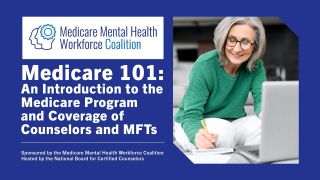Therapy
New Mental Health Care Opportunities During Open Enrollment
Choices you make this fall can affect your 2024 emotional well-being.
Posted October 16, 2023 Reviewed by Michelle Quirk
Key points
- Those on Medicare will soon have an expanded network of clinicians from whom to receive mental health care.
- Become an informed mental health consumer and research the choices you have during fall open enrollment.
- Know out-of-pocket costs and communicate plan details to your mental health clinician.
BREAKING NEWS: Mental health care options expand for the New Year.
On December 23, 2022, Congress passed the Mental Health Access Improvement Act (S.828/H.R.432), and President Joe Biden signed this into law. This bill allows licensed professional counselors (LPCs, LCPCs) as well as licensed marriage–family therapists (LMFTs, LCMFTs) to enroll as providers in the Centers for Medicare and Medicaid Services (CMS) as Medicare providers.
This is nothing short of huge.
Both the House of Representatives and the Senate have come to understand—over two decades—the support that licensed counselors and marriage–family therapists contribute to mental health care, affecting millions of citizens.

Mental health organizations educated and lobbied lawmakers since before 2005. Various budget reconciliations were put to vote with inclusion of additional mental health professionals, but they failed to pass both houses of Congress each time, even when a global pandemic heightened a mental health crisis that the populace faced.
Clinicians with these licensure types had completed the required graduate courses, board exams, clinical hours, licensure, and continuing education that licensed social workers (LCSWs) had on the master’s level.
None of this changed. In fact, some LPCs or LMFTs held doctoral degrees. Fortunately, efforts culminated in 2023 with the passage of the Mental Health Access Improvement Act.
It’s taken nearly 12 months for CMS to update internal systems, and professional organizations have educated clinicians about the application process to Medicare.
With open enrollment, consumers have more choice after January 2024. As people sign up for Medicare Advantage or Supplement plans, this expanded network matters. Read on.

Employee Benefits Available to You and Dependents
Since one must enroll in Medicare at age 65, many people, especially employees, have more than one type of mental health coverage.
Employers unveil new benefits to their staffs, which often include an employee assistance program (EAP). Sometimes, these programs go along with your health insurance (e.g., Evernorth is the behavioral division of CIGNA Healthcare and offers a set number of sessions to its members). After these are used, one seamlessly continues if the therapist has paneled to accept both the EAP and regular health insurance. Newer EAP companies market and compare themselves against traditional EAP providers. Upon closer look at their research, one finds it originates within the company. Employers make these decisions for the most part, but employees can always use their insurance benefit instead.
Take stock carefully when you change jobs or benefit plans to be sure that existing mental health providers accept your new coverage. Otherwise, you may easily be surprised by a therapy bill when this could have been avoided.
Steps to Take
If you’re set to work on anxiety, depressed mood, attention deficit disorder, addictions, and other problems as the new year commences, research clinicians this fall and make contact early.
Currently, therapist websites may not list Medicare as a plan they take but know it’s coming very soon. You can use your search to check education, clinical and life experience, and theory of human behavior that resonates with therapists to bring about change in their clients.
That last item is too rarely considered, for some dub themselves eclectic, pulling from this theory and that to help clients tackle change. Some graduate counseling programs, such as Johns Hopkins University, instilled that, to graduate, one or two theories had to be embraced and articulated before a faculty panel and, subsequently, to those seeking help.

Why Act Now?
Most clinicians are still heavily booked with appointments, and some have had to drop insurance carriers that don’t reimburse commensurate to their education and session time spent.
One cannot assume all licensed counselors and marriage–family therapists will panel with Medicare, for this, too, will depend upon reimbursement. Making an inquiry, however, is wise. Therapists may designate certain case spots for Medicare or other health plans. Your research may cut down on waitlist time in the busy new year.
Each January, therapists face a higher call volume. People put up with poor behavior, bad habits, and tenuous relationships until after the holidays. Therapists are still stretched thin from pandemic caseload spikes. This speaks to why what you do now may affect the mental health care you receive in 2024.
When you find a clinician, complete the necessary paperwork completely and legibly, providing information that’s asked for whether you have Medicare, an employer-sponsored or exchange plan, or an EAP. Send copies of the front and back of your insurance card, your driver’s license to prove address, and any authorization with the name and date of birth of the one authorized for claim processing. This matters especially in couples or family therapy. Name, date of birth, and authorization number must match.
Clients should communicate to clinicians how their plans work, becoming informed consumers and helping payment along, in so doing. Visit your plan’s website, save the details to a readable PDF, and submit a copy with required forms.
More choice always comforts when life hits a rough patch. Just as you designate a primary care physician, it’s time to think about whom you might turn to for your emotional needs.
Copyright © 2023 by Loriann Oberlin, MS
References
American Counseling Association Lobbying Efforts: https://www.counseling.org/docs/default-source/government-affairs/aca-comments-on-cms-1770p-incident-to-proposed-rule-9-5-22.pdf?sfvrsn=f8e7302c_4
Medicare Reimbursement Now Law: https://www.counseling.org/government-affairs/federal-issues/medicare-mental-health-workforce-coalition




